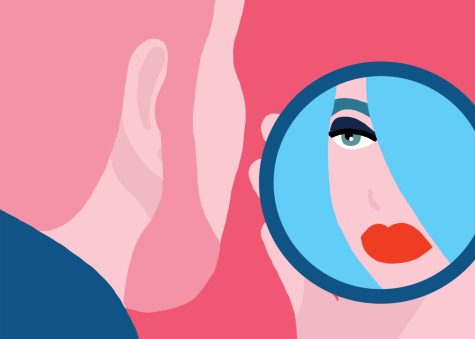Columbia students reflect on ‘passing’ and ways to support trans students
April 11, 2022

Charlie Warren, a first-year film and television major, identifies as non-binary, which is a term for people whose gender identity doesn’t sit comfortably with “man” or “woman.” Warren found themselves not even being able to attempt to transition or experiment with passing as another gender in their hometown in Kansas.
However, during their time at Columbia, they have been able to experiment more with how they present and how they like to be perceived.
The annual Trans Day of Visibility is over, but the trans experience is a year-long experience for those who identify as trans, nonbinary, and gender nonconforming. With the experience comes a lot of joy, a sense of contentment, but also some struggles.
“[I’ve learned] I want people to assume at first glance that I’m masculine or a male,” Warren said. “Something along those lines. Not that I am [male], but that’s what I want to pass as.”
Warren said not passing can be difficult, but they try not to take it too personally when they are misgendered. According to U.S. Department of Justice’s Office Victims of Crime, passing is when someone is perceived as male, female, or another gender, however, how a person is perceived by others is not always consistent, which can lead to misgendering.
“I do recognize that I don’t necessarily pass very well. I get [called] ma’am a lot by people. Usually, I’ll correct them, and they’ll get better after that,” Warren said. “But, initially, [passing] is not something I think I do necessarily very well.”
The concept of passing itself is a bit controversial, with some people having the idea that those who pass are superior to those who don’t, which consequently invalidates and dehumanizes those who may not pass. Online, Warren has seen many trans kids ask others how well they pass, even going as far to ask people to rate them on how well they would pass if they saw them on the street.
“It’s not a healthy thing,” Warren said. “I don’t want to discourage trans people from thinking it’s wrong to want to look the gender that they identify as, but there’s a really toxic mindset that goes into ‘if I don’t look trans enough, or if I don’t pass, then suddenly it’s not acceptable.’”
While others don’t pass, some do. Finn Schulz, a first-year photography major, now a year on hormones, has what he called “passing privilege,” which is a privilege a trans person who is perceived as cisgender has that may limit their risk of facing prejudice, harassment and risk of violence, as well as result in better employment opportunities.
“I know that not everybody can [pass]. Personally, I like passing and it is my goal, but I don’t have the idea that everybody needs to pass,” Schulz said. “It’s up to them if they want to have that as a goal or not.”
Schulz began transitioning his junior year of high school, which was when the COVID-19 pandemic was starting. There, he began to present online and in-person as male. Schulz’s transition, like many others, did have some struggles, as he was often misgendered by people close to him.
“I got misgendered for a really long time, and honestly, I still get misgendered by those people in my personal life, like my family,” Schulz said. “Now that I’m on hormones, I have a deeper voice, and I appear as a masculine figure and pass to strangers.”
Schulz said it is important to not make assumptions of what people’s pronouns are and to always make sure to ask them when you first meet them.
Matthew Rillie, coordinator of Student Support and Engagement, works closely in the Student Diversity and Inclusion office on advocating for trans students, as well as other issues concerning the student experience.
“If a policy or a resource is not actively inclusive for trans students, then we’re [SDI] going to fight to change it,” Rillie said. “If it’s not actively doing work to include and affirm and help heal students who have been hurt by systems of power, then I’m not interested in it.”
Rillie said resources such as gender-inclusive housing, gender-inclusive restrooms, the trans union, first name change forum, The Rack, and more, have all been student demanded and fought for by students.
Despite the resources having grown and expanded over the years, Rillie said there is still a long way to go.
“We also try to create a space for healing. I think that piece [healing] gets ignored widely,” Rillie said. “As resources grow, that’s great, but often when they’re not there, there’s a lot of harm that happens. So we center a lot of our work on both healing and advocacy.”
August Miller, a junior computer animation major, works as an intern for Student Diversity and Inclusion, where his role is to research, develop and orchestrate ways to better the lives of LGBTQ+ students on campus.
Miller runs the Trans Student Union, which caters to students who identify as trans, nonbinary and gender-nonconforming. The group has open discussions, arts and crafts sessions and more.
The group meets weekly on Fridays from 4 to 5 p.m. at 618 S. Michigan Ave. on the fourth floor.
“Basically, we just want to create a safe, affirming environment for trans people to exist in a space for an hour every week,” Miller said. “Whoever wants to come can come and there is not a certain amount of meetings you have to come to.”
For students looking for gender-inclusive resources, visit Student Diversity and Inclusion’s Gender Resources page.







